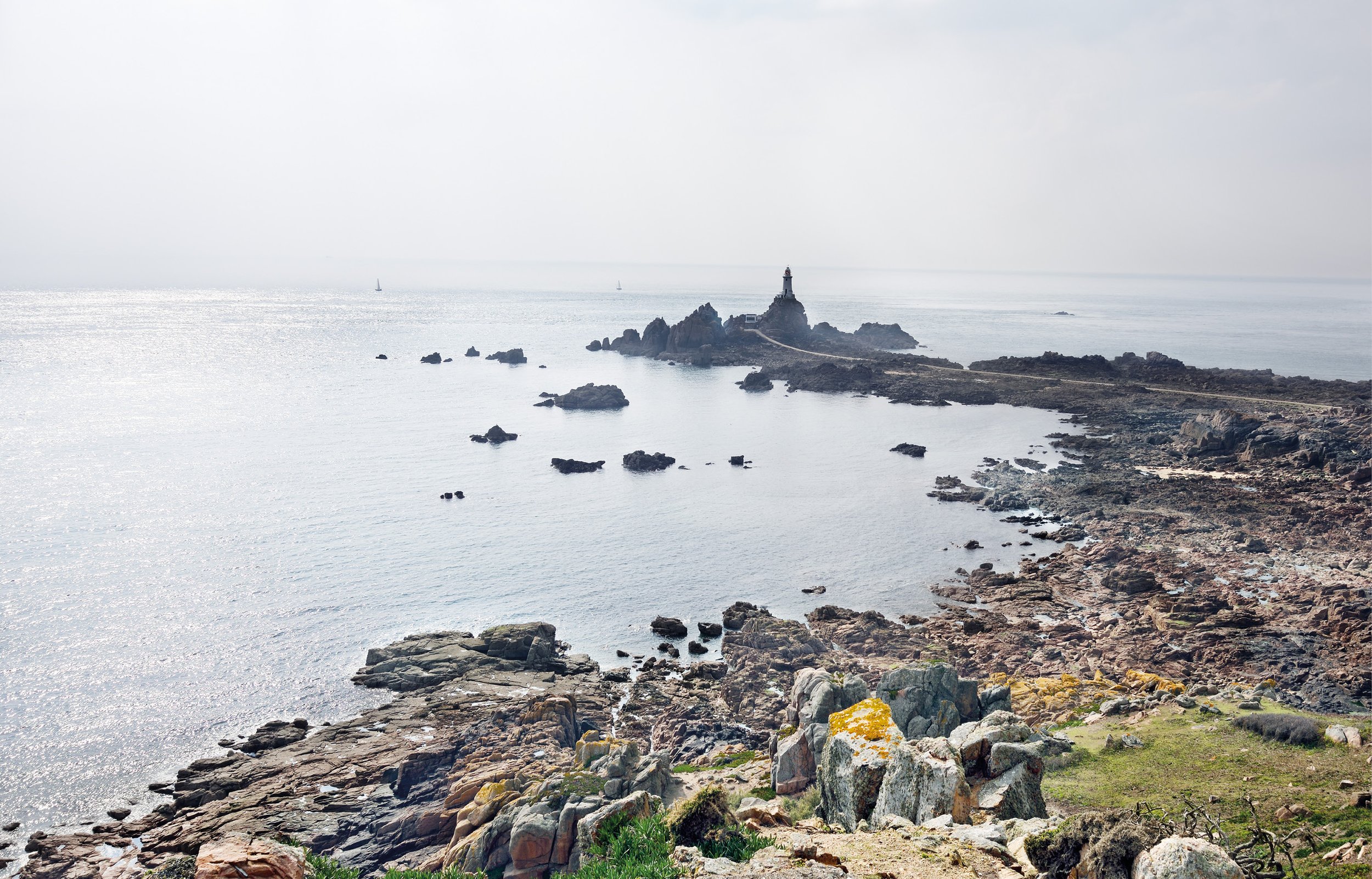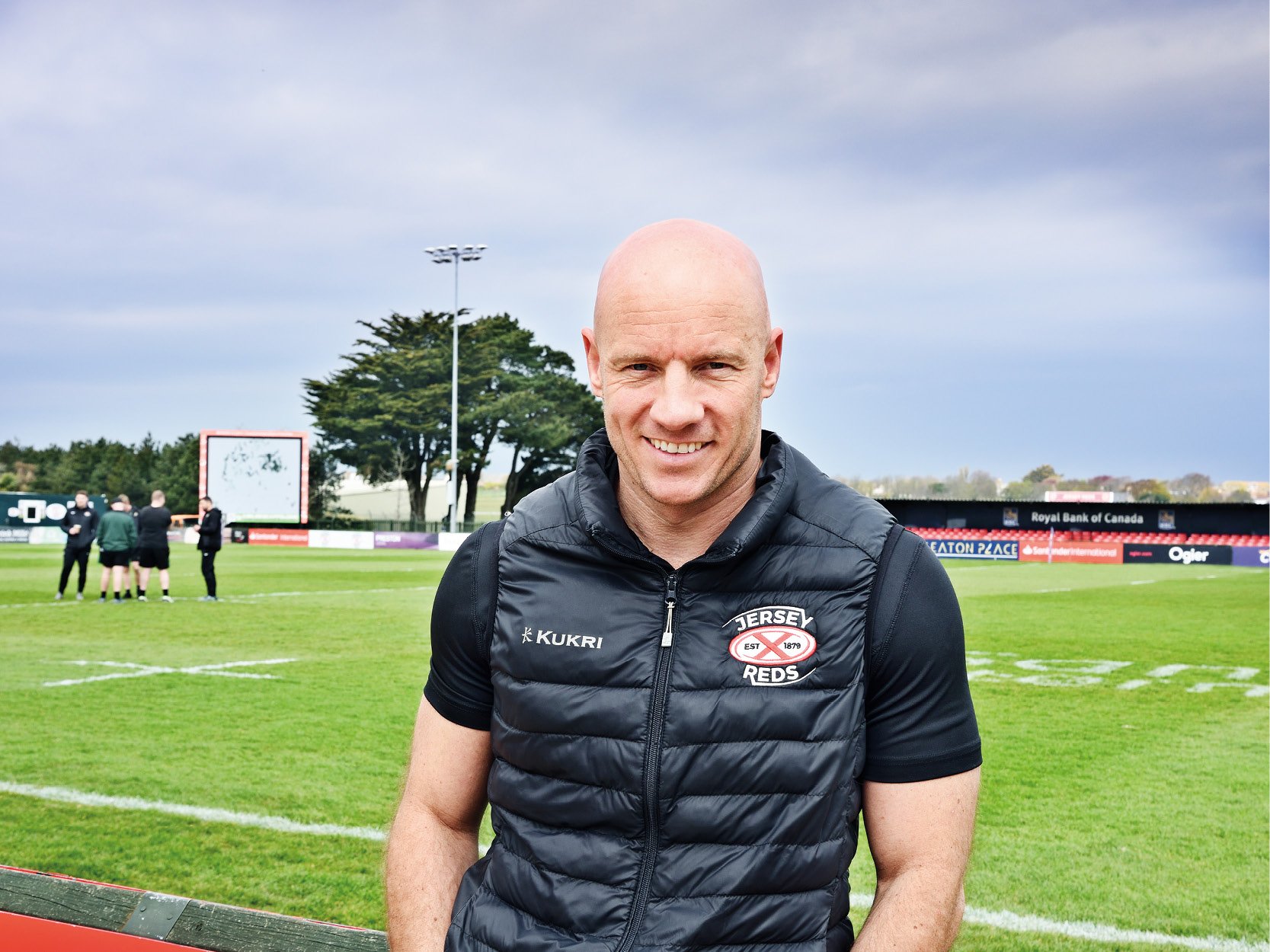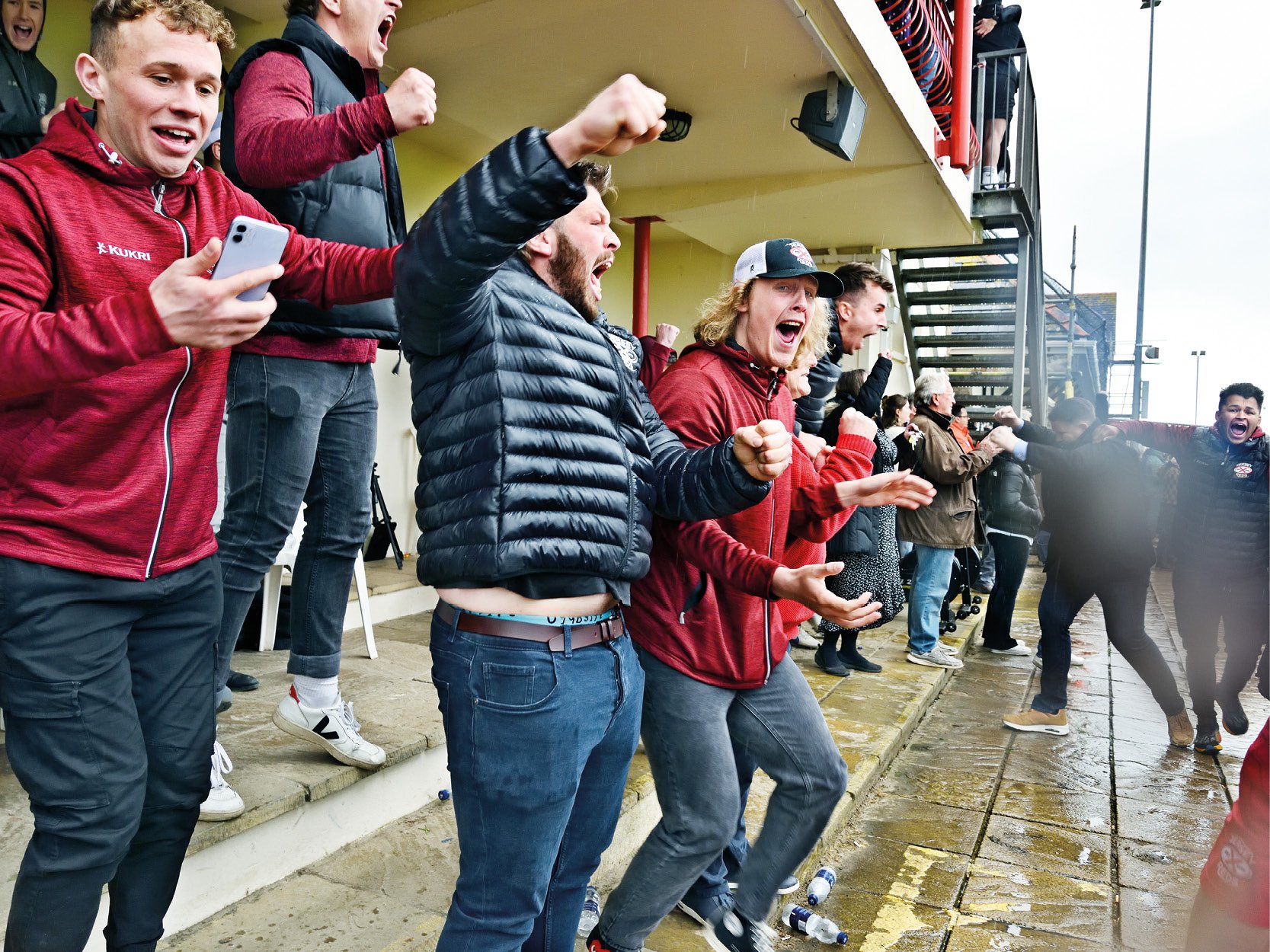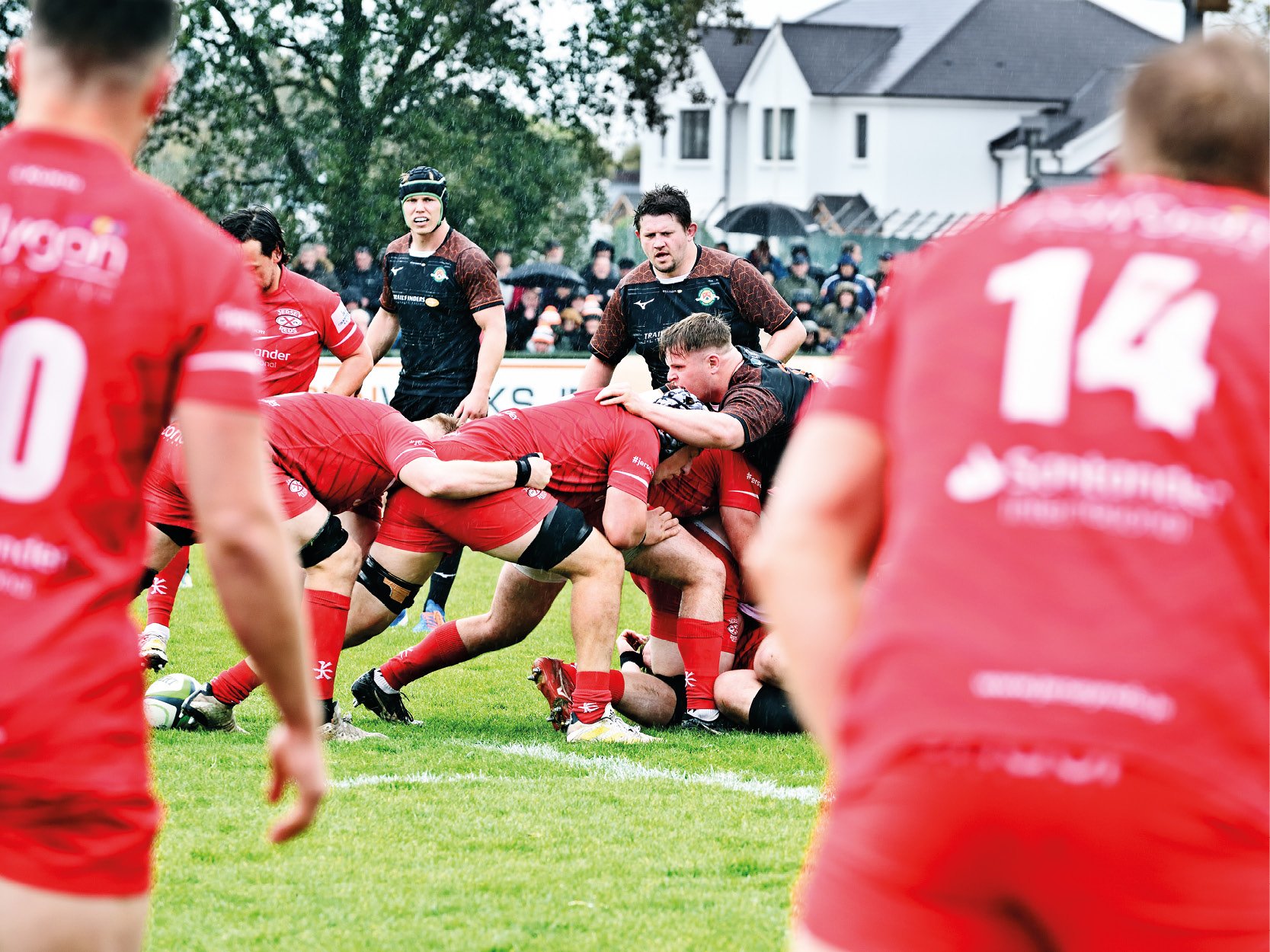Jersey
Just west of France on an island stretching nine miles by five, you’ll find one of the ten oldest buildings in the world, deserted Nazi war tunnels, a booming financial centre, two languages and the best rugby side outside of the Premiership, the Jersey Reds.
The island of Jersey is a land of diversity. To the north, granite cliffs carpeted in gorse and heather overlook shining clear blue waters. To the east Mont Orgueil, a castle over eight hundred years old – once a seat of both French and English medieval power – commands the coastline. Les Ecréhous, a smattering of islands and rocks, off this eastern border, now uninhabited but once home to infamous recluse Alphonse Le Gasteloise, a fisherman on self-imposed exile.
The capital of St Helier, tucked into the southeast corner, is an island seaside town like no other, its harbourside hotels, bars and restaurants shrouding shiny office blocks and one of the world’s most economically prosperous financial centres. On the five-mile stretch along the west coast the island presents an unspoiled sanctuary of sea and sand, dotted with honesty boxes, coffee spots and wartime bunkers. And ten minutes in-land from there, across sandy dunes and past the airport, is a rugby club.
For anyone who has had the privilege of attending a game in Jersey, it doesn’t take long to recognise just how unique a rugby experience it is. You catch the first sight of the rugby ground before the wheels of the plane have touched tarmac, the Stade Santander International being within walking distance of the airport. It makes for a unique backdrop with lineouts and rolling mauls framed by the lurid orange of an EasyJet Airbus A320 readying for take-off.
This season, Jersey Reds have truly taken off in the Championship and today is the pivotal moment in the season and the biggest fixture in their history – a title decider against defending champions and financial giants Ealing Trailfinders.
Despite Ealing leading the league for almost the entire season, Jersey are just eighty minutes away from leapfrogging their rivals into first, defying the odds and taking the title into their own hands with one game to go.
Jersey and sport isn’t the obvious double act. The islands’ achievements on the sporting stage seem largely unheralded, aside from being the birthplace of ex-England footballer Graeme Le Saux. Even that is topped by neighbours and arch rivals, Guernsey, who call the eminently gifted Matt Le Tissier their own.
And yet, make no mistake, Jersey has some famous names to boast, it’s just that their pomp was somewhere between the invention of radio and television. Harry Vardon and Ted Ray, both multiple Major winners in golf – the interlocking fingers of the ‘Vardon grip’ virtually ubiquitous among golfers today.
When it comes to rugby, there’s Matt Banahan. And that’s pretty much it.
But with the trajectory of Jersey Reds, that seems destined to change. Since signing their first two professional players in 2006 the club has experienced a meteoric rise. Becoming the only professional sporting outfit in all the Channel Islands, Jersey hit a wave of success towards the end of the 2010s with four promotions in five seasons taking them to the Championship for 2011/12.
Over the years, they’ve steadily improved their league position, from relegation battles to mid-table to, today, a chance at lifting the trophy.
It’s a season of change too, with the club having split with the amateur arm at the start of this season, making Jersey Reds a fully-fledged professional rugby entity, so perhaps it’s no coincidence the pieces have started to fall together.
The Stade is a modest home for the championship hopefuls. The clubhouse, a largely unremarkable building, replaced its wooden predecessor in 1994, but holds within a collection of over eight hundred club plaques, with space for only half of these to be on display. It sits opposite the quaint Lord Jersey Stand, its 213 seats highly sought after among Reds fans, with marquee coverage down the right side the only other protection from the elements. Wood chippings border the pitch underfoot and portacabins, dotted around the ground, house bars.
What is striking for a four thousand-capacity ground is its calibre of sponsors. A Santander banner runs the entire length of the pitch on the clubhouse side and the stand opposite is emblazoned with a Royal Bank of Canada logo. Given Jersey’s status as a financial hub courtesy of the absence of inheritance, wealth, corporate or capital gains tax, perhaps it shouldn’t be surprising, but with plastic garden chairs leant up against the sponsorship boards it feels like two worlds colliding.
An hour or so before kick-off, what is set to be a bumper crowd is beginning to gather. We find Mark Morgan, chairman of Jersey Reds for the last seven seasons, in the hospitality area pressing the flesh. He’s not the club veteran you might expect, he’s younger than most chairs, only a few years past retirement age, and full of energy. Mark first moved to the island in 1981 for the same reason many have done – love. He married his wife and immediately started playing rugby for the first team, playing over 250 times for the club throughout the 80s, many of those with the captains armband. After a decade on the island Mark was on the move again, spending the next 25 years working from Singapore to Indonesia to Dubai. When retirement came a move back to Jersey called, and he got back involved in the club straight away. “We could have sold out twice up here,” says Mark of the two-hundred-strong hospitality crowd. “Loads of people were disappointed, but we can only get so many in. We’re so excited, this must be the biggest sporting event in the history of the Channel Islands ever.”
Rugby at the Stade has a relatively short history with the club only moving to the St. Peter site in 1961, but the game had first been played in Jersey more than a hundred years prior. By 1876, an Island team had emerged; in fact, two had appeared, the Wanderers and the Island, although they appeared to be virtually the same side under different banners. Rugby disappeared from the island for thirty years in the early 20th century but returned in 1934, albeit briefly. Another pause during the years the Nazi’s occupied the island, then in 1948 the club finally became an official member of the Rugby Football Union. The decades that followed was largely fuelled by the competition of touring sides, the likes of Cross Keys, Bedford and Cardiff among those to make the trip over.
What those tourists would have discovered was an island of contradiction and complexity. Six times closer to France than the land of its crown, the island’s political, cultural and economic status is exceptional. The Bailiwick of Jersey is a self-governing British crown dependency, as is the neighbouring Bailiwick of Guernsey, which incorporates the islands of Alderney, Sark and Herm.
Keen to stand on its own feet, Jersey is eager to distance itself from the idea that it is reliant on mainland support, but at the same there remains a powerful connection to the monarch. Even that support though is somewhat different, with Jersey folk referencing the monarch not as King or Queen but rather will toast ‘Notre Duke’ to a raised glass of Calvados. This stems back to when Jersey was a part of the Duchy of Normandy, whose dukes became kings of England after 1066. When Normandy was eventually returned to France in 1204 the island remained in the possession of the English king.
Others have left their mark, or scar in some cases, with the Nazi occupation during the Second World War another particularity that is still a lasting presence both on the landscape and the consciousness of the people. In 1940, the British government decided that the Channel Island would not be defended from German forces, and what followed was almost five years where freedoms were revoked, and the island teetered on the edge of mass starvation. But the fortifications built on Jersey were a matter of pride for the Nazis, with Hitler commanding the islands to be turned into ‘an impregnable fortress’ and in doing so pouring unwarranted resources into islands whose importance was far less strategically significant than it was symbolic.
It’s these intricacies that breed a great pride in the Jersey identity. And today that pride hangs squarely on the shoulders of the men in red facing their rivals from England’s capital. “We’ve had much more of a focus on ourselves this week,” explains Harvey Biljon, the Jersey Reds’ director of rugby, when we catch up before kick-off. “We are a little bit unique. We’re on an island, we travel together, we live together, we go for coffees together, and I think that makes a difference. There’s no doubt the guys recognise how far they’ve come, but the community has been on that journey with us, it’s not just been about us.
“I think they will play a big part today,” he continues. “Yesterday afternoon, there’s a pub next to the Waitrose, I was off to get dinner, and there was a group of builders going, ‘whoa, Jersey Reds’ . So yeah, the support has been great. It’s not just a rugby club but a rugby club that represents a whole island, which is special.”
South African Harvey, a London Wasp in his playing days, is approaching ten years with Jersey and knows the enormity of fixtures like today. Jersey is the third club on his coaching CV, beginning at Blackheath in 2005 before moving up to the Championship with Cornish Pirates. After nearly five years in Cornwall it was time to head even further south, arriving in Jersey in the January of 2014 with a relegation fight to contend with. His hand was crucial in steering the club to safety, just about, a final day win at Bedford ensuring Jersey’s survival at the expense of none other than Ealing.
There’s history between these two clubs. Relations date back to the 2010/11 season when Ealing were promoted as champions of National 2 South ahead of Jersey, before joining them after a play-off win over Loughborough at Twickenham. The rivalry continued the following season and this time it was Jersey who took the title and were promoted to the Championship ahead of Ealing. Harvey and Jersey may have had the last laugh in 2014 but in the seasons after the capital city club’s development has overtaken them, albeit backed by a financially well-endowed owner. Today is Jersey’s chance to turn the tables of fortune once again not just for themselves, but on behalf of the island.
With Mark and Harvey at the wheel, the club has reached this point faster than either of them had anticipated. “At the beginning of the year we put out a three-stage process to try and get to the position where we are today, we’ve just exceeded expectations,” explains Harvey. “We’ve had moments before, like the British and Irish Cup final [a 29-28 loss to Munster A in 2017] but this is different.
“It’s been a bit of a roller-coaster of a journey make no mistake, from a relegation fight to a few little financial wobbles and just keeping the team on track. There’s no doubt it will get a little emotional at some stage too, it’s an unbelievable island.” His train of thought waivers and he draws a deep breath. There’s a glimmer of emotion, but the broad smile is still there. “I’m normally pretty clear, you’ve caught me out,” he laughs. “We’ll see how that one unfolds during the day.”
It’s an hour and a half to kick off and Trailfinders are filling the pitch. The visitors have brought a herd of ninety in their travelling pack from players to coaching staff to various assistants. Ealing’s media team alone is at least four-strong; meanwhile, Jersey’s team includes long-time volunteer press officer Tom Innes and one of the injured players helping with the Twitter. “It is slightly incongruous having part time volunteers involved in a professional club, but not unique,” says Tom. “My wife Kate [fixture secretary] and I, we do quite a bit for the club, frankly Kate does an incredible amount for someone with a full-time job.”
With kick off minutes away, there not an inch of pitch-side barrier left unclaimed. It’s a crowd of just over three thousand, around three per cent of the island’s population, and the community feel is in full flow.
The game begins and it’s tight. The home side are on the offensive in the opening minutes and kick for the corner. An eager ball boy is forced to vault himself over a fence and salvage the ball from the oncoming traffic of the neighbouring road, but for all his enthusiasm it was Ealing who scored the first try.
Jersey hit back before half-time, centre Alex McHenry and prop Sam Grahamslaw with the tries to give them a slim 14-12 lead. It was to be a tight encounter for the remainder. The lead changes hands no less than six times, but a score with fifteen minutes remaining from the Reds’ Will Brown ultimately proves the difference, the home side adapting best to the weather lurching from bright sunshine to hammering rainfall either side of the break.
Under waterproofs, tweed flat caps and umbrellas there is a collective roar as referee Christophe Ridley blows for full time. A 19-13 victory is theirs. A run of thirteen consecutive league losses to Ealing has been broken, setting up a fairy-tale title-clinching weekend at home to Ampthill. Despite the rain players dutifully hug parents, partners and babies, choosing to gather in a circle on the pitch rather than venture back inside. This is a moment to be shared with all, it’s a journey they’ve all been on together. Back in the clubhouse, a wooden league table is updated to a chorus of cheers and raised pint glasses as Ealing’s panel is replaced by Jersey’s at the top of the table. One final win and a first ever Championship title would be in their hands.
We never find Mark again in the melee that followed his club’s historic win, so instead pick up with him the following day.
Mark is still brimming with pride, albeit knowing there’s still a job to do, but focuses less on what’s happened and more on what’s to come. “I think the boys are very grounded,” he says. “They know that without a performance against Ampthill the whole season becomes nothing effectively. Plus, we’ve got our sights set on doing the double, we can’t do that without a win tomorrow.”
It’s a high bar that Jersey have set themselves given the tribulations, largely financial, of the past few years that Mark has helped steer the club through. In 2016 the stresses of professional rugby had taken their toll on their coffers to the extent they were forced to sell their assets in return for £1.5m in funding via a sale-and-leaseback arrangement for the ground. While the rugby was progressing on the field the club had yet to transition to a professional governance and business model, so with this loan came necessary personnel changes in the board room. The assets were regained in 2018 as Jersey received a more benevolent loan from supporters, funding which proved crucial to Jersey ‘righting the ship’ in light of total funding cuts of almost 75 per cent from early 2020.
Having now split the amateur and professional side the Reds have attracted new investors, and while Mark cannot reveal who is involved, he reveals they are islanders keen to see how much further the club can go. “What I would say is we need more,” says Mark. “I don’t just mean more money, but more investors. What we learn from looking at the Premiership is how dangerous it can be if you owe everything to one person. It’s like buying stock, you don’t just buy one because if that goes bust you don’t have anything. We want a number of investors, spread the risk so there’s less burden on each individual investor.”
With this new era, the club are preparing themselves for bigger and better things. “The easiest way to sum it up is to say that we are ambitious,” continues Mark, “but with the absolute lack of any support from the RFU it’s hard for clubs to keep going quite frankly.”
The conversation has taken a turn in a matter of words, his tone of voice hovering somewhere between stern and steadfast. “We have absolutely no idea what the structure of the game is going to be looking like at the elite level, and most importantly we don’t know what it looks like financially.”
Despite Jersey being on the cusp of the greatest achievement in their history, it is hard for Mark to look past the fact that nothing but uncertainty lies ahead. Financially and structurally English rugby is in a quagmire – Championship clubs do not know how many clubs will be involved, how many fixtures to prepare for, how the league will be structured and whether ring-fencing or promotion will be in place. It’s impossible for clubs to plan for the future when there’s been no clarity from the RFU.
Promotion and relegation is one of the central enigmas that has yet to be adequately solved. The usual reward for triumph in the second tier will not be bestowed on Jersey this season as they do not meet the minimum standards criteria for top-level rugby, namely a home stadium with the potential to hold 10,001 fans. For clubs like Jersey then, with a capacity of around four thousand, the current structure creates a dissonance between their ambitions and their ability to reach it. Premiership rugby is their goal, and yet there is little hope or support from the RFU for this to become a reality. “We all know that professional rugby is a precarious job, let’s say,” continues Mark, a slight pause cushioning his careful choice of words. “We are not going to go out on a limb and bury ourselves in debt in order to play Premiership rugby. If the playing field is evened and we know what we’re going to earn for putting the effort in, then we can build a strategy around it. But I don’t think it’s fair to expect clubs to reach certain minimum standards, on grounds for example, when there’s absolutely no provision of funding to help them do that.”
Mark is clear and concise as he vents his frustration. You can tell from his manner that he’s an astute businessman, his years of experience in banking management reflected in the precision of his arguments. But the emotion that underlies his words is also unmistakeable; he is a true club man after all, a former captain. Perhaps unsurprisingly then, it is the total absence of direction and leadership from rugby’s governing body that he finds so exasperating.
It’s not even a question of promotion for Mark. “The Premiership need to have a more generous understanding of just what clubs at our level can bring and do bring,” he says. “I have no doubt in my mind that the Championship is, and should be, a critical part of the player development pathway. Since I’ve been chairman, that’s seven years now, we’ve sent 43 lads up to either Premiership or equivalent clubs, and at the end of this season we’ve got another bunch going on.
“We’ve got Tomi Lewis going to Scarlets. Tomi had been let go by Scarlets at the end of last season, we picked him up. He hadn’t played any rugby whatsoever for the longest time. He’s been with us, he’s been one of the top try scorers in the Championship now and he’s got himself a full-time contract back with Scarlets.
Alignment between the two leagues is the logical answer for Mark. “I would like to see two leagues of ten professional teams, Prem 1 and Prem 2, call it what you will, and funded accordingly. I’d like to see both of those leagues under the same ownership umbrella, because ultimately that makes a nice package to go out and sell to sponsors.”
Out of his window Mark can look straight out to the French coast, and it’s there he believes English rugby needs to draw its inspiration. “I don’t think it’s any coincidence that France are about to instigate a third tier of professional properly funded rugby. In pre-season we play Vannes in Brittany and their budgets are ten times what we have to work with – ten times at the same level!”
What’s it been like running a rugby club? “How do I say?” he mutters. “The rugby is what keeps me sane. Let’s put it that way. Everything else, trying to fundraise, trying to argue with the RFU, all of those things are wearing but thank God we have Saturdays and thank God we have great rugby to go out and enjoy, because that’s what we do this for.”
The road ahead is certainly unclear but Jersey have manoeuvred themselves into a pretty good spot, first, to be precise, as they secure the title the following week with a 43-15 victory over Ampthill. They have a strong vision, a dedicated fanbase, and the island is behind them, yet the Premiership drawbridge remains closed to them. It seems an insurmountable obstacle, but that’s also what they said about Ealing.
Story by James Price
Pictures by Nick Dawe
This extract was taken from issue 22 of Rugby.
To order the print journal, click here.

















